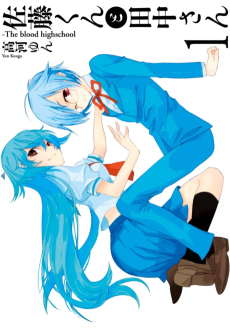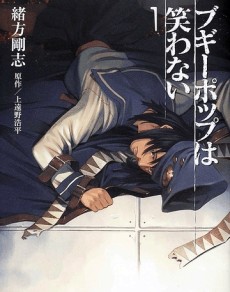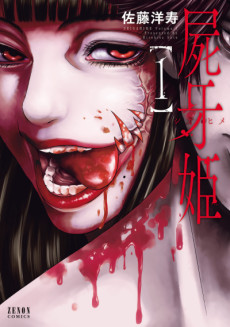WARAU KYUUKETSUKI
STATUS
COMPLETE
VOLUMES
2
RELEASE
January 1, 1998
CHAPTERS
19
DESCRIPTION
Volume 1 : The Laughing Vampire.
While a young boy, just resurrected as a vampire, commits acts of awful ferocity, the city around him shows all its perversion. The adults abuse their power, the boys degenerate and use all the available means to achieve their goal to give vent to their low instincts. Whoever can't understand and make opposition is doomed to change or becoming crazy. So which is the real horror? The vampire who kills in order to feed himself or the crawling disease hidden in society, which slowy corrupts without being noticed?
Volume 2 : Paradise.
Following the events narrated in the first volume, Luna and Konosuke are now living together with the old woman vampire as fellows, as lovers, in a diabolic innocence, killing for quieting their thirst for blood, joining death and love under the dream of eternal youth. Meanwhile, a young boy named Makoto is looking for his lost sister Miko, who disappeared years ago in mysterious circumstances. But what really happened to that girl who liked eating grubs and dreamed of becoming one of them? And is there really a terrible secret that someone is hiding? The paths of all the characters will dramatically collide, bringing unexpected consequences after the things are gradually revealed.
A story suspended between weirdness and decadence, showing a clear nostalgia for German cinematography and Federico Fellini, where blood is used to trace a great and only apparently amoral story.
CAST
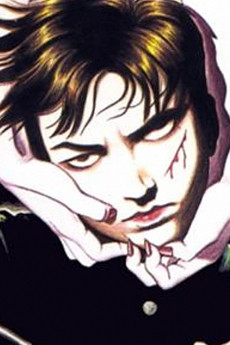
Konosuke Mori
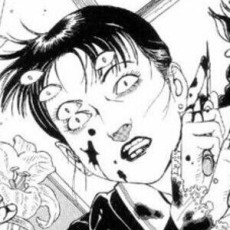
Luna Miyawaki
CHAPTERS
REVIEWS

ohohohohohoho
90/100Vampirism is all around us, and the light is always somewhere else.Continue on AniListI have been a fan of horror manga and eroguro, via Junji Ito and Shintaro Kago, since I was a high school student. They were, along with Naoki Urasawa, the mangaka that got me interested in reading manga. Although I've also been acquainted with Suehiro Maruo's work since around that time, due to a friend's recommendation of The Strange Tale of Panorama Island, it wasn't until about a year ago that I first read Warau Kyuuketsuki. That was after quite a long hiatus from reading manga and watching anime, and it actually rekindled my relationship with these media in the past year, and started me on a binge of Maruo's manga, which led me to Shuuzou Oshimi, and onward.
I've always been fascinated by Suehiro Maruo's manga, sort of hopelessly enticed by it, but any solid understanding of what it is that grabs me about it has always eluded me. What is it about the macabre subject matter and his visually, kaleidoscopically beautiful and disorienting investigation of it that I can't seem to turn away from? What is it that seems to be lacking in those works of Shuuzou Oshimi, which are clearly tremendously indebted to Suehiro Maruo?
In rereading Warau Kyuuketsuki, I've realized my fascination with its characters and images has subtly guided my thinking and my reading over the past year. After acquainting myself with some of the writings of Georges Bataille and Julia Kristeva I have a clearer idea of what I love about it, what it means to me.
Suehiro Maruo was a friend to Saeki Toshio (who died last year, RIP) and Terayama Shuji. Ultimately I think these three men were interested in and bonded over the dissection of our subconscious apparitions. That is where the horror and drama takes place. This story isn't frightening because of the vampires, but because of the nihilistic violence humans dole out onto one another, out of fear or out of desire. The erotic elements aren't physically arousing, they're sublime. The horror elements aren't fist-clenching, they're heartbreaking. These stories show how the unspeakable, taboo contents of the human mind, of collective unconsciousness and human behavior, keep humans caged in perpetual misery. What we desire we can never have, and what we fear and hate is the hopelessness of our aspiration to get what we desire, the absence of hope and meaning in our lives. These feelings, and society's provocation, its stoking of the flames of our desire and consequent anguish, cause us to lash out. Yet our struggle in this cage, the drama of it, even while we are taking out our misery on ourselves or those around us, is somehow both horribly sad and beautiful.
This story starts out with a series of panels that strike me as an allusion to the bombing of Hiroshima (although in the Crying Vampire, the final 10 pages of the series, which serve as a prequel, Onna is already a vampire in the Taisho period). Rakuda Onna, the monstrous source (by way of the bomb, which is the real source) of all the other characters' vampirism, is, in a sense, born from the rubble of this horrific event, much like the deranged artist from Panorama of Hell by Hino Hideshi. It cannot be underestimated what an astonishing impact the dropping of the atomic bombs had on humanity's collective identity, and obviously, especially Japanese consciousness, as borne out in countless works of fiction by Japanese writers and artists from all walks. I mean, Godzilla for fucks sake.
Recently I have started to wonder if the world didn't end in some way when those bombs dropped. In the film Hiroshima Mon Amour, the impact in the bomb on Hiroshima was described as the entire city being lifted into the sky and falling back to Earth in the form of ash. This was an act of violence committed by men against men; by men who were somehow undaunted by the visceral, unfathomable consequences of their actions on a staggering number of distant, innocent people. This event makes concrete the obliteration of meaning, and the birth of a perpetual fear of living in a world ruled by no principles, where this type of mass murder could occur on a whim at any given moment. Life couldn't ever be the same. H.P. Lovecraft wrote to capture the horror of living in a vast, uncaring cosmos. Warau Kyuuketsuki is the horror of living amongst humans who all subconsciously share that insight that H.P. Lovecraft wrote about: an awareness that we live in a universe wherein there is no God, no transcendent meaning, no eternal consequences.
Yet, tragically, we have to live our lives as if there IS meaning. Some of us try to do good, to treat each other well, while surrounded by ever piling evidence that humans don't have any inherent kernel of goodness. Our innocence is gone, and our attempts to be good people and find things worth living for are in fact inhibited by those countless people around us who take advantage of this newfound paradigm of relativism and nihilism to justify their gluttonous selfishness and disregard for the lives of others.
In Warau Kyuuketsuki, we see characters become acquainted with this horrific truth about the nature of human life one by one. Their innocence dies and they seek revenge, but there's no object for their disdain except life itself. They transfer their animosity onto people who have wronged them or strike them as immoral. Luna, as Sotou drowns, asks in a soliloquy of sorts if Sotou (who is the titular Laughing Vampire, actually) was mentally ill, or if it's just life that makes people this way. Earlier she explains to Mori (or is it the other way around? Difficult to say who's speaking in this scene, but worth noting that Luna's name is, well, Luna) that she thinks that the moon is a hole in our black evening sky into another world filled with light. Light no longer exists in our world, it is always somewhere else, some place we're locked out of.
Vampires are alive yet not alive. They survive off of the life force of humans (which they both are and aren't, as well) like parasites, regardless of what suffering they may incite. In this story, they're born from the destruction of innocence, the shattering of the illusion of idealistic possibility. When Luna is overwhelmed by loathsome reality, after she's been raped and after she's witnessed the mutual manipulation and self-abasement that goes on between her peers and the elderly: the mutual sacrificing of self worth and dignity for the satisfaction of pitiful and disgusting desires (an exchange of money for the young girl's pure, innocent body, the two things we're culturally instructed to seek after as the ultimate sources of satisfaction), she tells her mother she's been bitten by a vampire (though of course, even though, unbeknownst to her, there are literal vampires lurking around in this story, she hasn't literally been bitten by one of those. She's been "bitten" by her social reality). She gives herself a tattoo that's reminiscent of the Batman symbol (her adolescent trauma, which shatters her reality and spurs her transformation, is actually similar to that story of Bruce Wayne, though Batman and Warau Kyuuketsuki seem to operate on quite different wavelengths otherwise.)
The only liberating possibilities in this sort of world are death or ecstatic pleasure so powerful that it momentarily dispels subjective consciousness and reason. For these characters, death is no longer possible, and sex has been replaced as a source of ecstasy by the ingestion of untainted blood, which entails the harvesting of the most innocent forms of human life the main characters are capable of getting their hands on; including, or perhaps especially, infants. Yet the more they kill, the more their bodies are ravaged by age and weakness. Pleasure requires suffering; they are two sides of a coin, just like sacred and profane, freedom and imprisonment, transgression and limit.
This story makes those notions manifest plainly, through metaphor. Vampirism is all around us, and the light is always somewhere else, only accessible to us in brief glimpses amid our most frenzied, inhuman states, and always at a cost.
SIMILAR MANGAS YOU MAY LIKE
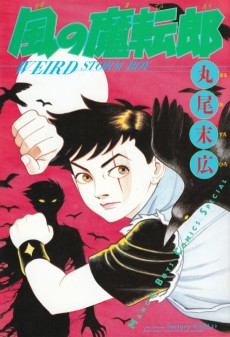 MANGA MysteryKaze no Matenrou
MANGA MysteryKaze no Matenrou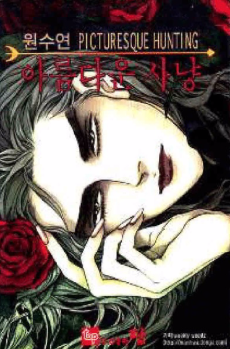 MANGA DramaThe Devil's Trill
MANGA DramaThe Devil's Trill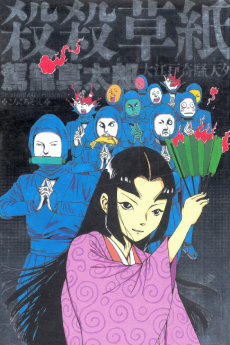 MANGA HorrorKorokoro Soushi
MANGA HorrorKorokoro Soushi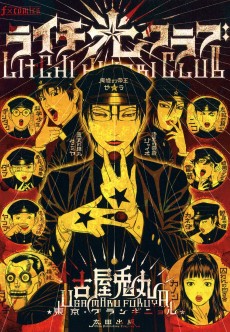 MANGA DramaLitchi☆Hikari Club
MANGA DramaLitchi☆Hikari Club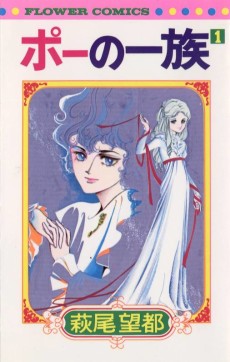 MANGA SupernaturalPoe no Ichizoku
MANGA SupernaturalPoe no Ichizoku MANGA ComedyYofukashi no Uta
MANGA ComedyYofukashi no Uta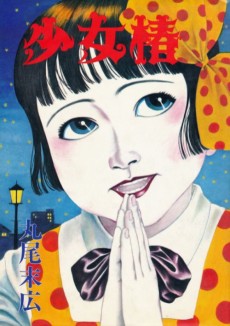 MANGA HorrorShoujo Tsubaki
MANGA HorrorShoujo Tsubaki
SCORE
- (3.3/5)
MORE INFO
Ended inJanuary 1, 1998
Favorited by 108 Users


